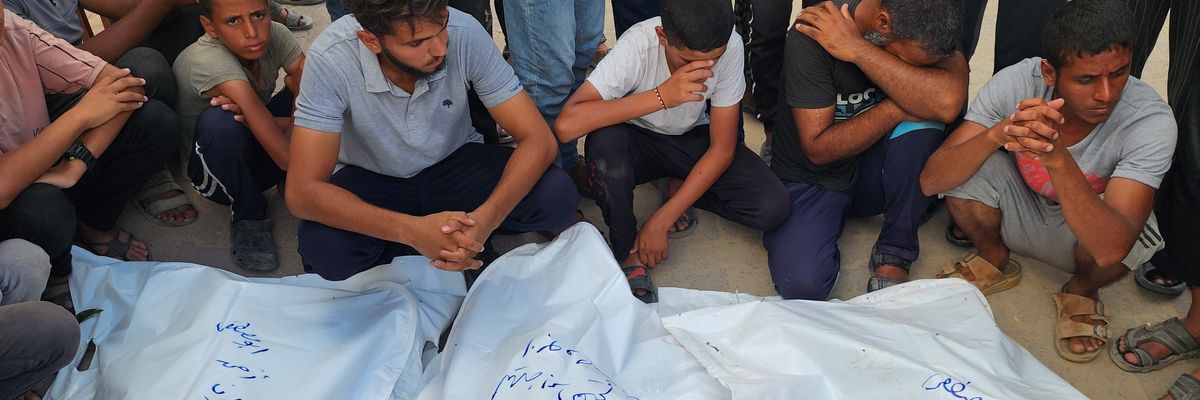Amid the decimation of Gaza's healthcare system and Israel's relentless attacks on the enclave, officials have struggled to account for all the Palestinians who have been killed since the Israel Defense Forces began its assault in October—and a new analysis shows how "indirect" killings will likely push the death toll of the war to what one peace advocate called an "unfathomable" number.
In a letter published in the medical journal The Lancet on July 5, three public health experts cited a previous official death toll of 37,396, but pointed out that "armed conflicts have indirect health implications beyond the direct harm from violence," making it likely that the total number of deaths of Palestinians so far is much higher—and could ultimately reach close to 200,000, if not more.
"Even if the conflict ends immediately, there will continue to be many indirect deaths in the coming months and years from causes such as reproductive, communicable, and noncommunicable disease," wrote the authors. "The total death toll is expected to be large given the intensity of this conflict."
Since the authors researched the analysis, the death toll has grown to 38,193, according to Gaza health officials.
The authors wrote that an untold number of Palestinians in Gaza have died as a result of destroyed healthcare infrastructure and an inability to get medical care, starvation amid Israel's near-total blockade on humanitarian aid, and the loss of funding to the United Nations Relief and Works Agency for Palestine Refugees in the Near East (UNRWA), one of the "very few humanitarian organizations" still working in Gaza.
Rasha Khatib of the Advocate Aurora Research Institute, Martin McKee of the London School of Hygiene and Tropical Medicine, and Salim Yusuf of McMaster University and Hamilton Health Sciences noted that "in recent conflicts, such indirect deaths range from three to 15 times the number of direct deaths."
"Applying a conservative estimate of four indirect deaths per one direct death to the 37,396 deaths reported, it is not implausible to estimate that up to 186,000 or even more deaths could be attributable to the current conflict in Gaza."
Using the 2022 population estimate of more than 2.3 million people, the projected total death toll "would translate to 7%-9% of the total population in the Gaza Strip," reads the study.
Anthropologist Jason Hickle said the study pointed to "apocalyptic figures" in Gaza.
The Gaza Health Ministry's death count has been questioned since Israel began its bombardment of the enclave, with U.S. President Joe Biden saying in October that he had "no confidence" in officials' reports and the U.N. revising its civilian death toll in May as the Health Ministry amended its reporting of unidentified bodies.
Despite that change, wrote the authors, "the number of reported deaths is likely an underestimate," both because of "indirect" causes of death and the probability that thousands of Palestinians are still buried under rubble left behind by Israeli air-strikes.
"The U.N. estimates that, by February 29, 2024, 35% of buildings in the Gaza Strip had been destroyed, so the number of bodies still buried in the rubble is likely substantial, with estimates of more than 10,000," reads the analysis.
The authors also dismissed claims by Israeli authorities and others who have contested the Health Ministry's figures, noting that the Israeli intelligence services, the World Health Organization, and the United Nations "all agree that claims of data fabrication leveled against the Palestinian authorities in Gaza over its death toll are 'implausible.'"
Considering statements by top-level Israeli officials regarding their intent to "thin the population" of Gaza, "to a minimum," as Prime Minister Benjamin Netanyahu has said, political analyst Omar Baddar said the estimated true death toll "isn't all that surprising."
The analysis was published days before the Israeli news outlet +972 Magazine published an article drawing from interviews with six Israeli soldiers who described how they "routinely executed Palestinian civilians simply because they entered an area that the military defined as a 'no-go zone'" and followed a "systematic policy of setting Palestinian homes on fire after occupying them."
Andre Damon of the World Socialist Web Sitesaid the projected death toll outlined in The Lancet represents "a systematic effort to exterminate the Palestinian people: armed, funded, and led by the U.S."
Israel faces an ongoing South Africa-led genocide case at the International Court of Justice.
The authors of the study said that "an immediate and urgent cease-fire in the Gaza Strip is essential, accompanied by measures to enable the distribution of medical supplies, food, clean water, and other resources for basic human needs."
"At the same time, there is a need to record the scale and nature of suffering in this conflict," they wrote. "Documenting the true scale is crucial for ensuring historical accountability and acknowledging the full cost of the war."
